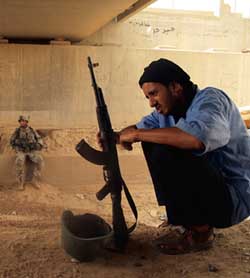 |
 |
| current issue |  | past issues |  | send a letter/news |  | address update |  | advertise |  | about us |  | alumni home |
Campus Currents
|
To Iraq and Back
A former embedded writer tackles English 401 By Crystal Ward Kent '78 |
Easy to print version |
 |
Nathan Webster '95, '10G, a communications major at UNH, heard in 2007 that a friend of his who worked for a San Diego newspaper was embedded in Iraq. Webster wondered if the military would take a freelance writer. "I was concerned with what was going on over there, and wanted to know the whole story," he says. "To my surprise, I was accepted."
In a matter of weeks, he went from being a sometime sales rep and teaching assistant to a war correspondent. "Next thing I knew," he says, "I was ordering body armor from BulletProofMe and was staggering around in 120-degree heat."
Webster, who is now a teaching assistant in the English department at UNH and a graduate student in the master's of fine arts in writing program, was embedded three times with an infantry unit of the 82nd Airborne, operating out of Beyji, Iraq.
Webster's goal was to write profiles about members of the unit for the soldiers' hometown papers. At first, the soldiers wouldn't talk to him—they had just survived a truck bomb attack, and the atmosphere was tense. "It was an extremely stressful existence," he says. "We were mortared every day, there was constant gunfire, and you always had to watch for snipers—this unit had lost several guys to those kinds of attacks. You'd see a blue sedan with the trunk partway open—a typical sniper ploy—or maybe it was just a beat-up car whose trunk didn't close; you never knew, both situations were commonplace."
 Photo of Iraq, courtesy of of Nathan Webster '95, '10G |
After a while, members of the unit opened up. Webster gained great respect for the soldiers, whose average age was 21. Most were already veterans. "I was only there three weeks; these guys were serving 15 months, and they had to be hyper-vigilant all the time," he says. "As one soldier said, 'If it goes bad, it's going to go bad fast,' and that's how you lived your life—if you wanted to live."
Webster was embedded in Iraq again in 2008 and one last time in 2009. About 20 of the soldiers he had served with before were still there, but Webster found them, and Iraq, much changed.
"Iraq was more stable," he says, "so consequently, they were more relaxed. You never knew what was going to happen, but I think they were seeing the light at the end of the tunnel. 'Enthusiastically cynical' sums up the mood."
Webster is teaching English 401 this fall. "If I can be a war correspondent, I can face a class of freshmen without being nervous," he says with a smile. He's working on his thesis, and plans to turn his war stories into a book. Beyond that, he's made no future plans. "I'm just living in the moment now," he says. "I learned that in Iraq."
blog comments powered by Disqus

